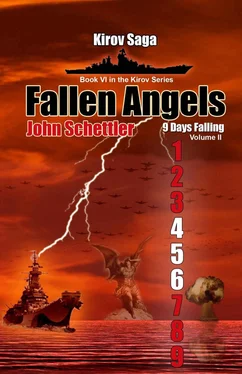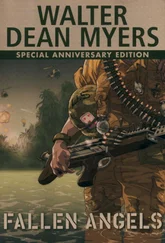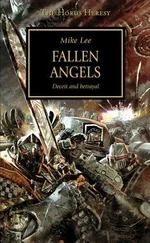“Well then…” Fraser cleared his throat. “Where do you want me with Task Force 37?” He folded his arms, resigned.
“Swing up north of Hokkaido, Admiral Fraser, and cut the bastards off from Vladivostok. Make sure nothing comes out to reinforce this Captain Karpov. We’ll handle the rest.”
“Very well. Admiral Nimitz, you know me to be a well seasoned officer of the line. If you won’t take my advice on not picking this fight, then allow me to suggest how you might win it. The Royal Navy has faced down this ship twice before, and here is how you must deploy…”
* * *
Fraser’sprimer was well reasoned, and Nimitz listened intently. All carriers should move to the rear in a widely dispersed formation. Aircraft must launch and assemble only to begin the operation. Thereafter they must disperse and come in from all compass headings on the target, and at layered altitudes. Sub flights were to break formation and scatter to make individual attacks the instant they were fired upon by aerial rocketry. It would be every man to himself from that point on. Coordinated air strikes were useless, but if the fleet air arm could keep consistent and constant pressure on the enemy, it was hoped some planes would penetrate the fearsome anti-aircraft defense and score hits.
While this air operation was underway, the carriers must be well screened by light cruisers and destroyers. Heavy cruisers and fast battleships were to break formation and deploy at intervals of five to ten kilometers presenting a wall of steel to the enemy. This would put the big ships within supporting range of one another, but not grouped to a point where more than one could be sunk by an atomic weapon. Upon contact with the enemy, they were then to close at high speed on widely spaced headings, get into gun range, and fight on a ship by ship basis, individually. Any destroyers that could be spared from carrier screening duty could serve as hounds to make torpedo runs at the enemy if possible. Every submarine available should be vectored in to attack.
The overwhelming force now available could not be used as a sledgehammer as it had been against the Japanese. Instead it must come at the enemy like a vast wave of steel, a tsunami of warships deployed on a widely dispersed front in a high speed charge. This way, even if the enemy used one of their terror weapons, they could only affect a part of the wave, blow one small gap in the line. If a ship went down, a reserve of fast cruisers would be held to fill the gap in the line, and the attack would roll on.
Nimitz listened, head cocked to one side, thinking these were some fairly outlandish naval tactics. He had two heavy fists with Halsey and Sprague, and two more behind them. Everything he had learned about war fighting relied on speed, concentration and firepower.
“Yes,” said Fraser. “That’s all well and good, but concentrate at your own peril. We learned that in the North Atlantic. Remember the Mississippi and the cruisers that went down with her. And as for your carriers, remember the Wasp —both of them. We also learned that your Captains are going to have to be prepared to take their lumps if you close with this monster, but close you must. If we can get three to five decent capital ships in gun range of this Russian flotilla, we should be able to hurt them badly. But getting there’s the rub.”
“We’ll get there, Admiral Fraser,” said Nimitz. “We’ll get there if I have to order ever man jack afloat out there to paddle in on a life raft with rifles. We’ve got good men at the tillers now, hard, experienced naval war fighters who won’t flinch. They’ll get the job done.”
“If they don’t concentrate.” Admiral Fraser put a hard finger on the table between them to emphasize his point. “Remember, Admiral, attack in force, but the entire formation must be widely dispersed. Do that and we can sink these ships, I’m sure of it. Yet if it comes down to the bomb, you might at least tell them it’s coming at them first. Perhaps that would stay their hand and put some sense into this mess.”
“Telegraph our punch? I suppose I could do that, but let me assure you that we’ll use that as a final measure, and I won’t take the decision lightly.”
“I’m sure of that, but I must tell you one thing more that neither one of us really cares to hear at this point in the war. Men are going to die here, and perhaps very many will not be going home on your Operation Magic Carpet. I’m sorry for that—sorry for the whole damn bloody business we’ve been about these last years.”
‘The Japanese are sorry too,” said Nimitz coolly. “The Russians will be sorry right along with them—” He looked at his watch. “I make it another three hours before the operation begins. The Russians have been circling in place and I’ve held Halsey and Sprague on a tight leash. It’s time to release the hounds.”
“God be with us,” Fraser sighed. “Yet if we can get this ship, history will thank us for it. More could be riding on this battle than either you or I can see right now.”
“I saw more than a thousand of those angels, that fell from Heaven like rain, above the gates, who cried angrily: ‘Who is this, that, without death goes through the kingdom of the dead?’ And my wise Master made a sign to them, of wishing to speak in private. Then they furled their great disdain, and said: ‘Come on, alone, and let him go, who enters this kingdom with such audacity. Let him return, alone, on his foolish road: see if he can: and you, remain, who have escorted him, through so dark a land.’”
Dante Alighieri, The Inferno — Canto VIII
“Black holes are the seductive dragons of the universe, outwardly quiescent yet violent at the heart, uncanny, hostile, primeval, emitting a negative radiance that draws all toward them, gobbling up all who come too close. Once having entered the tumultuous orbit of a black hole, nothing can break away from its passionate but fatal embrace. Though cons of teasing play may be granted the doomed, ultimately play turns to prey and all are sucked haplessly―brilliantly aglow, true, but oh so briefly so―into the fire-breathing maw of oblivion.”
~ Robert Coover
“Anyresponse, Nikolin?” Karpov was hovering over the communications station, an anxious uncertainty in his eyes.
“No, sir. There has been no reply to our last message.”
“Send it one more time. Tell them this is the last warning they will receive. They either grant my request for negotiation and make those arrangements to my satisfaction, or we will settle the matter in battle at sea.”
“Very well, sir. Sending now.”
Karpov paced as he waited, his footfalls seeming loud in the silence of the bridge. The tension was evident there, though the bridge crews were alert and confident at their posts. They had seen Karpov in combat before, and came to respect and admire his ability. Yet there was no way to bury the obvious emotion they felt as the prospect of another big fight loomed ahead of them. The Captain had just made a tremendous show of force. Ten minutes after his conversation with the American Admiral he had fired a MOS-III, programming it to make a run to a point some twenty kilometers northwest of the Halsey task force. The weapon it carried was only a 15 kiloton warhead, but that was nearly the size of the bomb the Americans dropped at Hiroshima, at least in one iteration of this history, the world still chronicled in Fedorov’s old books. It would detonate over a hundred kilometers to the south at a designated point, well over their horizon.
Читать дальше











